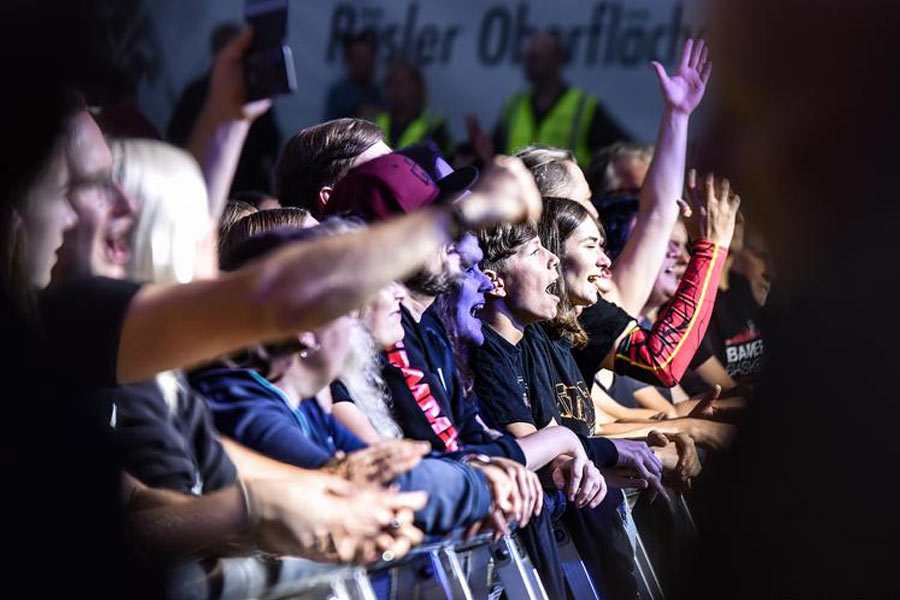In May, the Irish woman Shelby Lynn accused the singer of German rock band Rammstein, Till Lindemann, of asking her to have sex during a backstage party, and being angered by her rejection. She also suspected her drink was spiked with drugs.
The accusations didn't end there as reports emerged in German media that the band's frontman had recruited women for sex. The public prosecutor's office in Berlin is now investigating.
The British researchers Cassandra Jones, Emmaleena Käkelä, Kallia Mannousaki and Melanie McCarry published a study in March in which they report on misogyny, sexism and violence in the music industry. DW talked to the authors about the study in light of the allegations against the Rammstein singer.
DW: Were you surprised by the accusations against Till Lindemann?
Cassandra Jones: We'd spoken to almost 500 people who had worked in the music industry, who had told me many times over very similar stories of how when working as crew, they were asked to help facilitate a very similar scenario. And because I had heard that story many times, I wasn't surprised by that aspect of what happened or what came out in the media about Rammstein.
Across all music genres, there have long been rumors, accusations, and sometimes even charges of sexual assault involving female fans. Why hasn't there been a MeToo movement in the music scene?
Cassandra Jones: I think it's another aspect of of blaming women for what happened. It's similar to the myths of, 'oh, look at what she was wearing. She brought this on.' So in the music industry, we might be seeing something like, 'oh, they went to an event and they were drinking. What did they expect would happen?' So a lot of this, a lot of the general attitudes around the music industry is that, you know, the men can do no wrong even when they're perpetrating these horrific behaviors and it's the fault of the women. So we do need to see these attitude changes and awareness within the music industry, but also more broadly within society to get rid of this line of thinking. There is so little regulation, there's so little there are very few mechanisms to combat the endemic levels of sexual harassment, sexual violence and just overall abuse. I think you see in the UK, you see it in Germany, it's absolutely international.
What could help, what needs to happen?
Emmaleena Käkelä: It’s about thinking about the kind of messages that we send that can undermine allegations and pressure women from reporting violence and abuse. So if we look at the recent Rammstein reporting, the most recent read is that their lawyers are threatening legal action against those that are making statements against Lindemann. And these are just the kind of messages and this is just the kind of exercise of power that pressures people away from reporting abuse. And it sends a message that they're not believed and, those who have more resources have more power and are invincible.
What was the impetus for your investigation?
Cassandra Jones: My partner works in the music industry, and as I was getting to know him I was hearing these horrific stories of what it's like to work in it. And I was shocked that no one had a reaction to it. It was that normalized. And when I had informal conversations with people from all sorts of different roles and levels of power, and I asked them point blank: Have you ever been sexually harassed or assaulted? Like, oh, no, no. The conversation would continue and I'd ask them about specific behaviors and they'd all experienced it.
With the current accusations against Rammstein singer Till Lindemann, many fans react with the argument that so-called groupies have always existed. What is there to this image?
Kallia Manoussaki: It is a reflection of misogyny for lack of a better word. And it is the main cause of where we are and victim blaming a young girl who becomes obsessed with a celebrity and screams like we see in the pictures of the 60s. Those are iconic pictures where young women were fainting. But anyway, I don't think any of those young girls ever thought that she would be hurt. No one invites hurt, no one invites pain. But victim blaming can be so internalized that if they do get hurt and if they are in pain, they think it is because of something they did. But no one wants to be hurt. So if I want to be very pretty and I'm 17 and I'm wearing an amazing top and I feel really attractive, I don't want to be hurt. I just want to be attractive. And I certainly don't want to be hurt by some random person who thinks that I owe him my body and my attractiveness. You wouldn't steal someone's beautiful car. And yet we think we can possess women. So the whole idea about groupies is just another example of victim blaming and misogyny.
Emmaleena Käkelä: I would say that it reflects that sort of long standing difference in how we view male fans and female fans. Women are not viewed as credible fans and consumers of music, but but they're perpetually sexualized and objectified. And that also then reflects on how women are treated in the music industry more broadly in terms of as performers, as managers, as festival goers and so on. So I think it is a wider issue beyond the sort of groupie label that where these gender differences also affect how people are treated in those spaces.
"The sound of misogyny: sexual harassment and sexual violence in the music industry", a study by Melanie McCarry, Emmaleena Käkelä, Cassandra Jones and Kallia Manoussaki, was published in April 2023 in the Journal of Gender-Based Violence.











